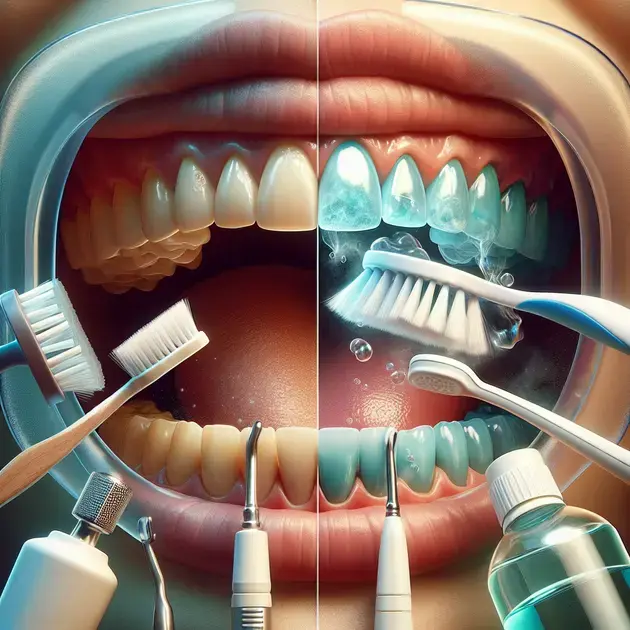Did you know that poor dental health can have serious consequences beyond just a toothache? “Poor Dental Health: The Consequences of Bad Teeth” is a topic that affects millions of people worldwide every day. From gum disease to heart problems, the effects of neglecting your oral hygiene can be far-reaching.
Recent studies have shown a direct link between poor dental health and an increased risk of developing conditions such as diabetes and respiratory infections. Taking care of your teeth goes beyond just having a bright smile; it is essential for your overall health and well-being. In this blog post, we will explore the various consequences of bad teeth and why maintaining good oral hygiene is crucial.

The Link Between Poor Dental Health and Heart Disease
Poor dental health is often linked to heart disease due to the spread of bacteria and inflammation. When there is a buildup of plaque and tartar on the teeth, it can lead to gum disease. This can cause inflammation in the gums, allowing bacteria to enter the bloodstream. Once in the bloodstream, these bacteria can travel to the heart and contribute to the development of heart disease.
To understand this link better, you can use the app “Oral-B App” which provides dental health tips and information on the connection between oral health and overall well-being. The app offers guidance on how to maintain good oral hygiene practices to prevent the risk of heart disease.
Regular dental check-ups and cleanings are essential in preventing gum disease and maintaining good oral health. By taking care of your teeth and gums, you can reduce the risk of bacteria spreading to other parts of the body, including the heart.
For more detailed information on the link between poor dental health and heart disease, you can visit the website of the American Heart Association. They provide comprehensive resources and articles discussing the impact of oral health on cardiovascular health.
Understanding and addressing poor dental health is crucial in maintaining overall health and preventing the risk of heart disease. By prioritizing oral hygiene and seeking regular dental care, you can protect not only your teeth and gums but also your heart.
The Impact of Neglecting Oral Hygiene on Overall Health
Neglecting oral hygiene can have a significant impact on overall health, leading to various oral health issues and potential systemic health problems. When proper oral care is not maintained, bacteria in the mouth can multiply and cause plaque to form on the teeth. This can result in tooth decay, gum disease, and bad breath.
To address the impact of neglecting oral hygiene, you can use the “Colgate Connect” app, which offers personalized oral care solutions and reminders for maintaining a healthy mouth. The app provides step-by-step guidance on proper brushing and flossing techniques to prevent oral health problems.
Poor oral hygiene has been linked to conditions such as diabetes, respiratory infections, and cardiovascular disease. By neglecting oral care, individuals increase their risk of developing these systemic health issues. It is essential to prioritize oral hygiene to prevent the negative consequences of poor oral health.
Seeking information from reputable sources like the American Dental Association website can help you understand the impact of neglecting oral hygiene on overall health. They provide tips on how to establish a good oral care routine and maintain optimal oral health.
By recognizing the importance of oral hygiene and taking proactive steps to care for your teeth and gums, you can improve your overall health and well-being. Neglecting oral hygiene can have far-reaching consequences, highlighting the essential role of proper oral care in maintaining a healthy lifestyle.
Why Maintaining Good Oral Hygiene is Essential
Maintaining good oral hygiene is essential for preserving the health of your teeth, gums, and overall well-being. Proper oral care practices, such as brushing twice a day, flossing daily, and visiting the dentist regularly, can help prevent dental problems and maintain a healthy smile.
To understand the importance of maintaining good oral hygiene, you can utilize the “Quip” app, which offers dental care tips and reminders for keeping your mouth clean and healthy. The app provides insights on the benefits of proper oral care and motivates users to establish good oral hygiene habits.
Good oral hygiene not only helps prevent tooth decay and gum disease but also contributes to better overall health. By taking care of your oral health, you can reduce the risk of systemic diseases and maintain a healthy mouth-body connection.
Visiting reputable websites like the National Institute of Dental and Craniofacial Research can provide valuable information on why maintaining good oral hygiene is essential. They offer resources on oral health research and education to promote healthy dental habits.
By recognizing the significance of good oral hygiene practices and incorporating them into your daily routine, you can enjoy a lifetime of healthy smiles and overall well-being. Prioritizing oral health is key to preventing dental issues and supporting your overall health.

Preventing Tooth Decay Through Proper Dental Care
Dental care is crucial in preventing tooth decay and maintaining overall oral health. By following proper dental hygiene practices, individuals can significantly reduce the risk of developing cavities and other dental issues. Brushing teeth at least twice a day with fluoride toothpaste, flossing regularly, and visiting the dentist for routine check-ups are essential steps in preventing tooth decay.
Another important aspect of dental care is maintaining a healthy diet. Avoiding sugary and acidic foods can help protect the teeth from decay. Consuming a balanced diet rich in vitamins and minerals can strengthen the teeth and gums, making them more resistant to decay.
It is also recommended to use mouthwash as part of a regular dental care routine. Mouthwash can help kill bacteria in the mouth, reducing the risk of plaque buildup and cavities. Additionally, drinking plenty of water throughout the day can help wash away food particles and bacteria, further protecting the teeth from decay.
Overall, practicing proper dental care, including regular brushing, flossing, dental check-ups, and a healthy diet, is key to preventing tooth decay and maintaining optimal oral health.
The Connection Between Oral Health and Respiratory Infections
There is a strong connection between oral health and respiratory infections. Poor oral hygiene can lead to the growth of harmful bacteria in the mouth, which can then be inhaled into the lungs, potentially causing respiratory infections. Maintaining good oral health is crucial in preventing the spread of bacteria from the mouth to the respiratory system.
Brushing and flossing regularly can help reduce the amount of bacteria in the mouth, lowering the risk of respiratory infections. Visiting the dentist for regular check-ups and cleanings is also important in maintaining oral health and preventing the growth of harmful bacteria.
In addition to practicing good oral hygiene, staying hydrated is essential for overall health, including respiratory health. Drinking an adequate amount of water can help keep the mouth moist, preventing bacteria from multiplying and reducing the risk of respiratory infections.
By taking care of oral health through proper hygiene practices and regular dental visits, individuals can help prevent the spread of bacteria to the respiratory system and reduce the risk of developing respiratory infections.
Healthy Habits for a Brighter Smile
Achieving a brighter smile is attainable through adopting healthy habits that promote good oral health. One important habit is to brush teeth gently but thoroughly at least twice a day with fluoride toothpaste. Proper brushing technique, including brushing the teeth, gums, and tongue, can help remove plaque and prevent staining.
In addition to brushing, flossing daily is essential for maintaining healthy gums and preventing tooth decay. Flossing helps remove food particles and plaque from between the teeth, where a toothbrush cannot reach, promoting overall oral health and a brighter smile.
Limiting the consumption of sugary and acidic foods and drinks can also help preserve the brightness of the teeth. These foods and beverages can erode the enamel and cause staining, leading to a dull smile. Choosing teeth-friendly snacks and beverages, such as fruits, vegetables, and water, can contribute to a brighter smile.
Finally, regular visits to the dentist for professional cleanings and check-ups are crucial for maintaining oral health and achieving a brighter smile. Professional cleanings can remove stubborn stains and plaque buildup, while routine check-ups can detect any early signs of dental issues, ensuring a healthy and radiant smile.
Conclusion
In conclusion, proper dental care plays a vital role in preventing tooth decay and maintaining optimal oral health. By incorporating practices such as regular brushing, flossing, dental check-ups, and a balanced diet, individuals can significantly reduce the risk of developing cavities and other dental issues. These habits not only protect the teeth but also contribute to overall well-being.
Moreover, the connection between oral health and respiratory infections highlights the importance of good oral hygiene in preventing the spread of harmful bacteria. By practicing good oral hygiene, staying hydrated, and visiting the dentist regularly, individuals can lower the risk of respiratory infections and promote better respiratory health.
Lastly, adopting healthy habits for a brighter smile, including proper brushing, flossing, and limiting sugary foods, can help maintain a radiant smile and prevent staining. Professional cleanings and routine dental check-ups are essential in ensuring long-term oral health and addressing any potential issues early on. By following these guidelines, individuals can achieve not just a brighter smile but also overall oral health and well-being.



